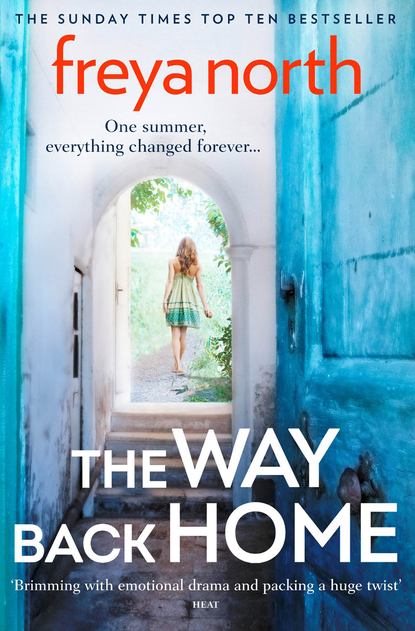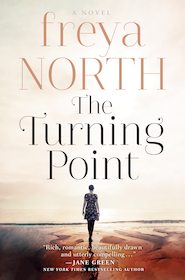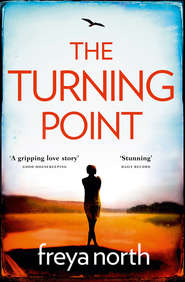По всем вопросам обращайтесь на: info@litportal.ru
(©) 2003-2024.
✖
The Way Back Home
Автор
Год написания книги
2018
Настройки чтения
Размер шрифта
Высота строк
Поля
‘No – but I used quite a lot of oregano. And a splash of Henderson’s Relish.’
‘Not in the dish,’ said Oriana, ‘there. On your windowsill.’
They all regarded the plants. Cat rolled her eyes.
‘Medicinal,’ Django defended himself. ‘Your husband’s the doctor, Catriona – he’s done research.’
‘You could get busted!’ Oriana said.
‘I am busted,’ said Django. ‘I have cancer. Prostrate.’
‘Prostate,’ said Cat quietly.
‘It’s very slow growing,’ said Django rather proudly. He tapped at the bowls in front of them. ‘Now look – eat up. I’ve been experimenting. If Tabasco is hot enough to blow your socks off, just imagine what it can do to cancer cells. They thought I was a goner. I’ve proved them wrong.’
This was a home where discordance was joyful, where love and hope provided the bedrock for whatever was dumped on top. Oriana felt more settled than at any other time since her return.
‘And will you be visiting Robin now you’re back?’
‘Unlikely,’ Oriana said.
‘So why did you return?’ Django pushed.
‘Sorry,’ Cat said to Oriana, under her breath. But it was fine.
‘It was time.’ She shrugged, paused, continued quietly. ‘Some things came to an end. Job. Lease. Other stuff.’
Django liked her ambivalence. He wasn’t very good at ambivalence and he admired it in others.
‘Can’t be easy, living where you’re living.’
Oriana shrugged. ‘It isn’t.’
‘Seconds,’ said Django and it wasn’t a question. He gathered the bowls and took them back into the kitchen to refill. Cat excused herself and disappeared upstairs.
Alone at the table, Oriana thought about her mother. She didn’t doubt that the woman cared about her, in her own way which could be detached and could be dramatic and was always self-centred. But she knew and her mother knew that the Hathersage house was no place for her.
‘Here.’ Cat returned with the local paper. ‘Just look at this.’
An apartment at Windward was up for sale.
‘That’s the last place on earth I’d live,’ said Oriana.
‘You couldn’t afford it anyway – they go for a fortune, these days.’
They peered at the pictures which, though in colour, were grainy. The main one was of the house – obviously taken during the summer months. There were four smaller photographs of interiors. Oriana considered them for some time.
‘I’m not even sure which one this is,’ Oriana said. ‘No one had a hi-tech kitchen like that when I was there.’
‘It’s Louis’, isn’t it?’ said Django, back.
‘Is it?’ said Oriana, grieving for Louis anew.
‘Look.’ He jabbed a finger at the final photo. ‘Where’s that then?’
The girls looked.
‘The oriel windows,’ Oriana said, ‘right at the top. But it can’t be Louis’.’
They read the details.
‘How on earth did they make three bedrooms out of his apartment?’ Oriana read on. ‘Two bathrooms, one en suite?’ She looked up at Cat and Django. ‘I loved it when it was Louis’. It was my place of choice for tea. It was always so genteel.’
Django laughed. ‘Fabulous old queen.’
Oriana turned to Cat. ‘Do you remember – after school – going for toast and to do homework at his kitchen table because it was so much quieter than downstairs?’
Cat looked at the details anew. ‘I can’t believe that this is Louis’ place. And yes, of course I remember.’
‘I practically lived there during exams,’ Oriana said.
‘Well – between Louis’ and ours,’ said Cat.
‘Two bathrooms and three bedrooms,’ Oriana marvelled again.
‘Crivens,’ Django murmured at the guide price.
‘Will you visit?’ Cat asked.
Oriana looked at her with exasperation.
‘I meant Windward,’ Cat said cautiously. She thought about it. It hadn’t been so long ago that she and Django had been estranged. However temporary it had been, it was hideous at the time. Oriana looked tired. Behind the smile and the teeth-whitening and Bobbi Brown cosmetics, it took an old friend little time to detect a degree of emotional exhaustion.
‘What’s the point? I haven’t spoken to my father in years. I rarely heard from him before that anyway. And I don’t know anyone there any more.’
It was only after Oriana had left, when Cat and Django were reviewing her visit, that they realized none of them had mentioned the boys. Not once. Not even when poring over the details of the apartment that had come up at Windward. The Bedwell brothers. Malachy and Jed. And Cat wondered whether they, like Robin, were dead to Oriana too.
CHAPTER FIVE (#ulink_ae313555-0d14-593e-9e0e-b3a005f562b0)
The front door was never locked but Jed was always acutely aware how nowadays, Malachy’s was one of only three dwellings whose front door remained resolutely unlocked. Nearly all the other apartments in the old house had new security systems and even burglar alarms. Still, along the Corridor – running subterraneous through the house like a hollow crooked spine – the internal doors joining it were unlocked. That had been the very point, back at the end of the 1960s, when the pioneering group of artists and writers and musicians had rented Windward. There was to be flow, Windward ho – ideas and creativity, triumphs and failures, music and colour, characters invented and real – into and out of the rooms, through the windows, across the seasons, during the days and nights. Now, with only two of the original seven artists still living there, Windward was a quieter place. Apartments were much changed. White-collar people lived there now, quietly, privately. Music, if it could be heard at all, came in faint, civilized drifts from radios and sound systems, not resident musicians. Colour these days was polite Farrow & Ball, rollered to a perfect chalky finish; not Winsor & Newton oils squeezed direct from the tube and daubed in a glistening cacophony of hues. There was a distinction between day and night now, between your place and mine. These days, residents wouldn’t dream of entering without knocking.
Nowadays, Windward was sedate, like a peaceable old uncle whose youthful tattoos were hidden from view. Cars were either German coupes or four-wheel drives and were parked neatly, herringbone style. Not Jed’s, though. He parked as he’d been taught, when learning to drive at Windward – askew on the gravel like a skate on a turn. Malachy knew this wasn’t in defiance of the residents’ association standards, it was because Windward was still home to Jed. He couldn’t distinguish between the Windward of his youth and the place today. And he didn’t understand the importance of compliance, because there’d never been rules back then and there’d been harmony. Whenever Jed arrived, his car was flung as if he simply couldn’t bear to be in it a moment longer. Into his childhood home he’d barge, rolling into his older brother’s life, shedding bags, heading for the purple velvet sofa. Into it he’d collapse and sigh as if Bear Grylls himself would have been hard pressed to make light of such a journey home as Jed’s. Really, it should have irritated Malachy, but instead it always slightly amused him. Jed’s return to Windward was akin to that of an adventurer walking through the front door, having spent years exploring the wilds of somewhere far-flung and dangerous. Namely, Sheffield, forty minutes’ drive away.
‘Hey!’ said Jed.
Malachy was finishing off a paragraph on his laptop. Jed waited until his brother closed the lid on his work.
‘The novel?’











